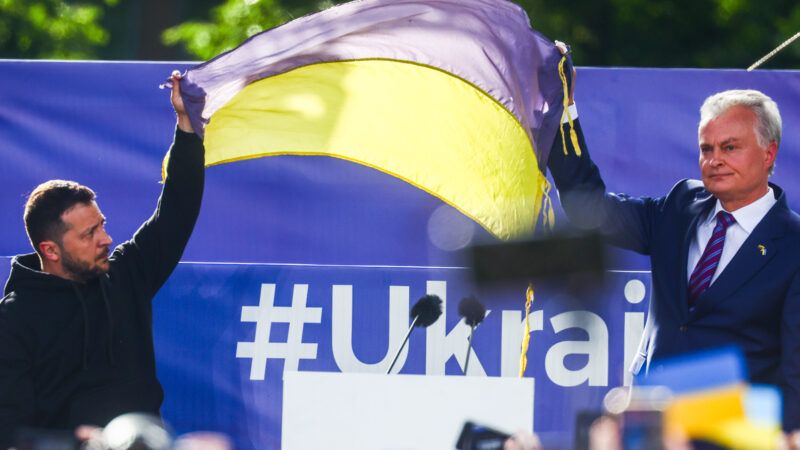NATO Made a Mistake by Promising Membership to Ukraine
The chance of open U.S.-Russia conflict really would increase if Ukraine were admitted to NATO.

Ukraine has waited for an invitation to NATO for years. Long before 2022's Russian invasion, and even before Moscow claimed Ukraine's Crimean Peninsula in 2014, Kyiv has sought to join the West's premier military alliance. And NATO, for its part, has sought to welcome Ukraine into its ranks—eventually.
In 2008, at a gathering in Bucharest, the alliance promised Ukraine could someday become a NATO member. "NATO welcomes Ukraine's and Georgia's Euro-Atlantic aspirations for membership in NATO," said a statement from NATO leaders. "We agreed today that these countries will become members of NATO," and "we make clear that we support these countries' applications" for the membership process.
This week, as alliance leaders assemble once more, Ukrainian accession to NATO has yet to be realized. And after a year and a half of war on Ukrainian soil, the question of bringing Kyiv into the NATO fold is more pressing than ever: Should NATO make good on its promise? Should Ukraine become a formal NATO ally instead of a unique recipient of members' largesse?
For any who deplore Moscow's aggression and cruelty toward Ukraine, it may seem self-evident that our answer should be "yes." After all, many NATO allies—the United States chief among them—are already sending substantial military and financial support to Kyiv to bolster its defense. Indeed, American involvement is significant enough that we're already risking conflict with Russia. Why not make it official?
Moreover, Ukraine's performance in battle has been remarkable. Where Russian forces were widely expected to sweep through the country and rapidly replace Ukrainian President Volodymyr Zelenskyy with a pro-Moscow puppet, Ukrainian troops have put up a staunch fight, stopping and even, in some places, reversing Russian gains.
So perhaps, as former Ukrainian President Petro Poroshenko wrote in Newsweek this week, "it is more than obvious that Ukraine's accession to NATO is necessary" for Ukraine and the allies alike. "A strong and battle-hardened Ukraine, with armed forces that fully meet the requirements of NATO membership, will be a powerful asset to the alliance and offer a guarantee of effective defense against any future Russian aggression."
That's an attractive narrative—Ukraine as an avatar of both might and right whose NATO membership would be beneficial for all involved. But the reality, unfortunately, is more complicated. Admitting Ukraine to NATO risks not just the security of extant alliance members but the prolongation of this very war.
Indeed, the position in which NATO's 2008 promise has put Ukraine these last 15 years is arguably the worst-case scenario, bestowing all the danger that comes from stoking Russian fears of NATO expansion and none of the advantages of the alliance. It's a promise that should never have been made and which, if now fulfilled, is unlikely to work in Ukrainians' favor—or ours.
The risk to Ukraine is easily summarized: An alliance membership hoped to shorten the current war will instead lengthen it by exacerbating Russian fears—whether justified or not—of Western attack.
"Major powers never calmly accept the close approach to their borders of unfriendly powers or alliances," as MIT political scientist Stephen Van Evera wrote in an explainer for Defense Priorities (a think tank where I am a fellow) shortly before the 2022 invasion. In this, "Russia is no exception," he continued. "It will not accept a settlement that leaves open the possibility of Ukraine in NATO or NATO in Ukraine."
As Van Evera went on to detail, neutrality agreements have worked in the past to forestall and settle conflicts like the one in Ukraine today. States react "with special belligerence to threats that appear near their borders," he wrote. "Perhaps such behavior is outdated: In the missile and cyber ages states can inflict great harm from great distance, so strategic depth matters much less." But, rational or not, this is still how states behave.
It's why NATO welcoming Ukraine would likely motivate Russian President Vladimir Putin to redouble his war effort rather than end it. The NATO-Russia border has already lengthened by more than 800 miles this year thanks to Finland's accession. Putin will not simply accept the addition of another 1,400 miles to that span. The notion that Ukrainian accession to NATO could cow Moscow into retreat is, sadly, a fantasy.
Then there's the risk for the U.S. and other NATO allies. Their reluctance to move forward in the membership process is "deep and understandable," as erstwhile neocon Max Boot wrote in The Washington Post, because of the basic fact that Ukraine "is at war with Russia and will be for the foreseeable future. This isn't a stable stalemate like the division of East and West Germany or North and South Korea. This is a dynamic, ongoing conflict that, if NATO were to take in Ukraine, could draw other members into a shooting war with a nuclear-armed Russia."
Such warnings of superpower conflict, and maybe even nuclear war, have become commonplace in the last 18 months. That familiarity should not dull us to their wisdom. The chance of open U.S.-Russia conflict really would increase if Ukraine were admitted to NATO, and the prospect of such a war really is horrible to behold.
Troublingly, the NATO leaders now gathering in Lithuania seem unwilling to revoke the 2008 pledge—nor to rip off the Band-Aid and bring Ukraine into NATO now, ending at least the uncertainty of the current situation. Instead, their draft statement on the subject, as reported by Financial Times, simply renews the 2008 document's delayed welcome: Ukraine can join—eventually.
The decision naturally angered Zelenskyy, who wants NATO admission as soon as possible. And that's a frustration those on the other side of the issue can share. NATO never should have promised membership to Ukraine. Repeating the promise is repeating the mistake.


Show Comments (186)